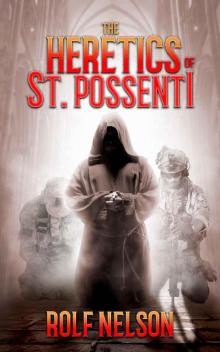- Home
- Rolf Nelson
The Heretics of St. Possenti Page 14
The Heretics of St. Possenti Read online
Page 14
“What does golfing have to do with cooking?”
“MOS—military occupation specialties. Every job type has a number and letter or two attached to it. Infantry is eleven-B, or bravo, and a food-service guy is a 92-golf, or G.”
“Ah, I see. Yes, I’ve heard the eleven-bravo term a time or two but thought it was slang for being in a messed-up unit with inept leaders putting you in dangerous places or something like that.”
“Hmmm… Can be that, too. Or maybe a synonym for I gave karma another crack at me. Anyway, he’s getting a pretty good list of things and wanted to check a range of used and new prices to get an idea of how much things might cost to get it set up and hitting on all cylinders, assuming something less than divine intervention on everything.”
“While we can pray for it, and I do frequently, we certainly cannot depend on it at every turn.”
“Don’t need a lot. Just enough.”
Sales Pitch
Let the Abbot always bear in mind that he must give an account in the dread judgment of God of both his own teaching and of the obedience of his disciples. And let the Abbot know that whatever lack of profit the master of the house shall find in the sheep, will be laid to the blame of the shepherd. On the other hand he will be blameless, if he gave all a shepherd’s care to his restless and unruly flock, and took all pains to correct their corrupt manners; so that their shepherd, acquitted at the Lord’s judgment seat, may say to the Lord with the Prophet: “I have not hid Thy justice within my heart. I have declared Thy truth and Thy salvation.” (Ps 39[40]:11)
The Holy Rule of Saint Benedict, Ch. II (The Qualities of an Abbot)
“The community around us, the entire nation, is failing some of its members, men with amazing potential.”
The younger man faced the archbishop across the older man’s cluttered desk. Both were dressed in their proper work attire. “Young men should be leading families and businesses and neighborhoods, but many are cast aside, crushed beneath the heel of the uncaring state and circumstances precisely because they have potential that isn’t being developed and milked for all it’s worth. We of the faith are failing because we are not meeting them where they are, where their current need is. We offer them the Maslow peak when they are without foundation. Young men are not worried about their souls when they are starving or fighting for the basics of life and safety. They are much too close to the bottom of the hierarchy to worry about the fancy things—getting laid has a much stronger biological pull to a twenty-five year old than something as abstract as Heaven in fifty years. We have to meet them where they are and offer them a service that is attractive now, but that will lead them on the right path in the long run. Show them strengths in this world they can use to get by today so they can gain spiritual strength tomorrow.
“A man with a gunshot wound needs prayers… but also a good trauma bandage and a transfusion. It’s the latter that has been metaphorically missing.
“I can deliver those young men to you, though not today, nor tomorrow. But they will come, in large numbers, with wives and children. In time.”
“What do you need to perform this miracle?” asked Archbishop Malone.
“For the first batch,” he paused, thought how to phrase it best, and continued. “I need a warehouse, nine million dollars, a pharmacist, some good lawyers, five years, and a one-way ticket to Vegas….” Cranberry deadpanned.
The archbishop looked at the priest before him as if he had lost his mind.
“The ticket to Vegas is negotiable, I suppose, if you can come up with the nine large.”
“Please be serious, Thomas.”
“I can drive. I don’t need a plane… Sorry. I’ve been spending a lot of time with young men who have a rather rougher sense of humor than the congregation. Seriously, though, nine million and some specialists. I already have the particular warehouse-like barn selected.”
“And what do you plan on doing with these things, were I to find a way to procure them, when we can hardly keep the lights on here?”
“I will found a new monastic order, for a new type of monk.”
“You are aiming for sainthood?”
“Oh, heavens, no! It will be named for Saint Gabriel Possenti. I’m hardly the saintly sort at this point.”
“The monastic orders are all but disappearing, and you want to start a new one?” His Excellency sounded skeptical.
“Yes. The orders are moribund because the world is changing, and they no longer meet the needs of many men. Something new is needed to attract these men, save their lives, and bring them back into civilization. As I said, an entirely new type of order. I expect that the archdiocese doesn’t have the money, but we need papal approval to start an order in any case, and I hope the money will come with the approval. And, considering the place we’ve picked out is in a different region, we will have to work with another diocese and likely take on board another priest from that region—preferably a relatively young one—so it’s going to be a walk in the park. A walk in Central Park at midnight, perhaps, but that just makes it all the more exciting.”
Archbishop Malone looked at his underling for a long time, thinking, and then looked up. He stood and paced for a minute. Then another. Finally, he spoke. “You have always been a good student and usually a serious man. I have no reason to doubt your sincerity. But you must forgive me for having doubts about your sanity. I expected something less outrageous than Buddy Christ but not so far afield as an entirely new monastic order. I think it would be good if you spelled out just exactly what you have in mind.”
* * *
For the next hour Bishop Thomas Cranberry ran down the litany of problems the young men in the target group faced in detail, covering it from a historical, societal, neurological, psychological, legal, and economic perspectives. Malone agreed that this sounded like a grim, nearly impossible, situation for many of them to recover from.
Thomas then provided an overview of services potentially available to them that they may need and hurdles they faced in recovery, how many different people they might see and places they needed to go to receive them, and most importantly why they often did not. The archbishop was shocked at how his own previous understanding of the issues had barely scratched the surface of the problem.
The third hour was spent laying out the program for the proposed monastic order and how its new and integrated approach could reach these men, how each part overlapped and interlocked with the others, how it would get started and grow, why each part would work, how it addressed a specific need directly or by working around drawbacks and side effects other possible solutions had.
Through it all, Malone asked few questions as he listened intently. When his protégé finished, the archbishop sat back, pursing his lips.
“You definitely are not crazy. You are nothing if not enthusiastic, knowledgeable, and ambitious about this idea of yours. Misguided, perhaps. But certainly not lacking in a clear vision of the problem and a potential solution where we have found none before—and not for lack of searching. Intriguing. We do not normally work with all those agencies, nor closely with other regions or archdioceses, but you certainly appear to have done your homework.”
“So you will back it?”
“Such a decision is not mine to make, and the finances do exceed the archdiocese’s coffers at the time. But I will most certainly pass the idea on; it is worthy of further research at the very least. I am certain one or two of the more reform-minded and traditionalist cardinals will like it. Some of them will hate it with a white-hot passion. The more conservative cardinals will likely be generally against it but will see its potential in the current environment. But most, I suspect, will not oppose it too vigorously until they learn more. A few always say nothing until they see how the wind blows. It will be divisive, I’m sure. Monks with guns? You will make enemies. Many priests these days are vocal pacifists. You must know that if you push this plan forward, then anything less than an earth-shaking success will guarantee you
will never become a cardinal yourself.”
Cranberry nodded soberly.
“But I do think it’s worth investigating further as I see no better plans on the horizon; indeed, I see no plans at all that address the issues you so poignantly lay out. I could do no less for you since you see the problem much more clearly than anyone else I’ve met.”
Two days later, Thomas Cranberry was on a plane for Rome.
* * *
When Bishop Cranberry was painting the picture of the problem much as he had to Archbishop Malone, the assembled cardinals nodded sagely, asked a few good questions, and expressed much sympathy and support. As he laid out the second portion of his presentation on the difficulties in getting help and reasons for not getting it, they expressed dismay and made understandable and pointed criticism for the political and social system that had failed its own men so badly. The general picture was well-known to them even if many of the details specific to the American situation were new.
Thomas started to lay out the solution. The first portion of the plan, focusing on substance abuse and depression counseling, physical work and job training for the monks, and many supporting details, along with the fact it was seen not as a life-calling but a waypoint, raised eyebrows and questions but more much more interest than heat: the potential benefits for someone going through the process were obvious enough.
After taking a deep breath, he finally arrived at the touchy part about martial arts and shooting. To say that part of the plan was divisive was a major understatement. Even the normally most cautious cardinals who were typically very circumspect in expressing their opinions staked out ground very firmly and very quickly. About two-thirds were vehemently against, one quarter supported it, and all the normal alliances appeared to carry no weight as they came down on different sides for different reasons. His initial metaphor about baited hooks didn’t go over well with this group of non-fishermen.
The cross-examination took nearly four hours, and he was glad that he’d prepared as well as he had with his arguments with John, Mickey, Erika, Bill, and the rest. They’d all spent more than a week challenging his facts and figures, logic, biblical references, New and Old Testament support, non-Christian philosophical grounds, and every assumption he had about it. Opus Dei was mentioned frequently. His hours of physical training served him well, too, as the constant challenge and response as they tag-teamed him with questions went on unrelentingly, the grueling intensity of it even taking a toll on those who were not the focus of so much emotion.
It was clear the majority were against the idea, but finally Pope Leo XV, who had remained nearly silent through the hours of presentation and cross-examination, spoke, “You bring a profoundly moving problem before us, Thomas. None here doubt your sincerity or good will—only your proposed methods. On that… grave concerns have been clearly expressed. We will have much to think about before we decide, but first: two questions for any who can answer.
“First: are there any here who do not think the problem he brings before us is real or think it one that we should ignore?”
The pope looked around the room, and none raised a hand or replied. One by one they indicated as he looked at them they thought it a real and serious problem, one the basics of which they were long acquainted with.
“Second: does any here have a better plan that he has not proposed before and which isn’t simply put forth here and now in reaction to Bishop Cranberry’s proposal?”
The faces around the room frowned, tensed, and looked about. It was clear what he meant, and trying to object at that moment with lawyerly phrase-parsing wasn’t what His Holiness Leo XV wanted. Not a man spoke up.
“While martyrdom is a blessed death, it is not required when facing violence. Self-defense is not heresy. Defending innocent life from evil is righteous. The question, then, is whether Bishop Cranberry’s proposal is a just and virtuous path.”
He faced Cranberry and looked him in the eye, his face formally polite but otherwise expressionless. “You have argued your position and thoughts with great energy, clarity, and knowledge, building a cogent case. As such, you give us much to think and pray upon as we seek guidance in this most serious and unusual of propositions you bring here. No new order of monks has been established in centuries, and no blessed chivalric orders in even longer.” His Holiness walked slowly between the cardinals as he spoke. “Opus Dei is the only organization that is similar to this proposal, but at its heart Opus Dei calls for an entirely different sort of man, with different experience, than the sort that the good Thomas Cranberry spoke of. I am not even sure if monk is the right word for the men you propose to train. We will give your… order… careful consideration. We thank you for your time and attendance.”
After the usual exiting ceremonies, Cranberry was escorted away by a middle-aged attendant who had been awaiting outside the door. As he walked, his escort was stony faced and silent. Reaching his assigned room, Thomas entered and sat heavily in a chair after draining a glass of water poured from a waiting iced carafe. He rubbed his faced tiredly. With the door closed, his escort’s face softened somewhat. “He can be intense. I’ve seen people collapse after only an hour meeting with him. I’ve never seen an ordinary meeting last that long.”
“His Holiness hardly spoke at all until the very end. I think he is inclined to support my proposal, but among the cardinals, most were against it.”
“Ah. Well. Very unusual. He’s a very acute questioner. If he didn’t speak much, it says much about how well you laid out your situation. But a wise leader doesn’t usually reject overwhelming opinion in opposition to his inclination…. All I can say is that it must be of great import, and it will take time before any decision will be made. May I bring you something to eat, or would you like to go out? Or simply collapse and sleep for a week?” His last was said with a knowing and gentle smile.
“Yes, thank you. A bite of something would be most appreciated. And only a day or three of sleep.”
“Very good, Your Excellency.” With that he let himself out and left Cranberry to ruminate in tired silence.
* * *
Thomas spent the next few days seeing a few sights, detailing his sources and numbers, answering questions, and getting very mixed impressions about what the older men thought. Clearly, some were against it entirely, some apparently thought the idea could be salvaged by stripping the martial aspect or by bringing it more closely aligned with the Swiss Guard or some other more formal and long-term arrangement while drawing on a more stable pool of men, and a very small number seemed to understand and agree with what he was aiming at and the obstacles he faced. More than a few thought it was entirely unnecessary, basically copying Opus Dei, and thus duplicating work already being done, except with unnecessarily controversial additions that contributed little.
His counterargument—that the symbolism of power would attract men who felt powerless—fell on many ears unwilling to listen or to try to understand.
It was late on the fifth day when His Holiness visited him unexpectedly shortly before he was to leave. He brought no retinue or pomp. After Thomas’s surprise and obeisance, Leo sat with a tired smile.
“You have only the faintest hint of the intensity of the debate you have brought upon us. I have not seen these good and careful men so passionate since we attempted to address the problems of the Second Vatican Council and the Society of Saint Pius X, following the heresy accusations and filial correction against the Antipope.”
Cranberry was floored that his proposal was considered to be in the same league as such monumental developments in the church.
“On the one hand, doing nothing to bring these good men who have been so badly used back into the fold when a path has been shown is to turn our back on them most cruelly. But the path you illuminate is fraught with danger and risk. It is not a path to be trod lightly. Before you came, we were aware of the problem, but having no solution at hand meant nothing need be done rashly. We need people in church, supporting
our causes and faith today, not just eventually; you are proposing to do something that might, perhaps, pay off one day… if you are correct in every fact, assumption, and action.”
“Much the same argument that the men turning away from the faith use as they leave. Ironic,” Cranberry said with more bitterness than he meant.
The pope nodded in quiet agreement, then shook his head sadly. “It’s a gamble, but a potentially necessary one. It may, possibly, even help us in the ongoing negotiations to undo the near-schism we face on account of the SSPX. Some of these humble and pious men are ready to resign either way.”
“Oh, that’s horrible!” Thomas said, aghast. “I had no idea that it might come to that. I was certain that either I’d missed something subtle, and the denial would be easy and well-supported, or that I was as undeniably right as Galileo, and support would be unified if grudging.”
“We are human, and emotional, as much as we might like to think otherwise. So, as to your order, I am splitting the difference.”
“Excuse me, Holiness? How can an order be and not be?”
“Not all things are do, or do not. You can be; just not be seen. New monks are rare; new monasteries more so. When so many are shuttering, a new monastery would normally be a major event, a cause for announcements and celebrations and ceremony. The emergence of an entirely new order hasn’t happened in living memory, not in eight centuries. It may one day be sung to the mountaintops.
“But I think this time, in these circumstances, it will be a very simple affair. Here, behind these closed doors. Silent as a church-mouse prayer in the night. You will have your chance to give it a trial run to see what sort of success and fallout you have. Enough money to get started, enough distance for plausible deniability should you have misunderstood your inspiration and things go awry, enough support if you need it to offer a reasonable chance of success.

 Insanity's Children
Insanity's Children The Stars Came Back
The Stars Came Back Back From the Dead
Back From the Dead The Heretics of St. Possenti
The Heretics of St. Possenti